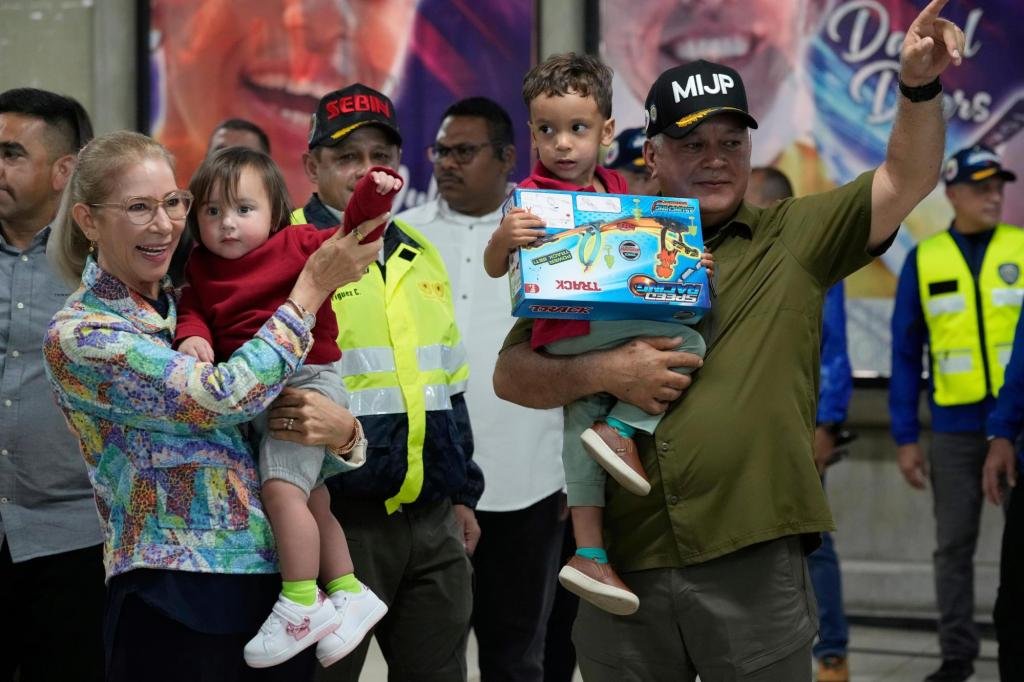Venezuela’s Diplomatic Gambit: A High-Stakes Prisoner Swap with the U.S. and El Salvador
On a sun-drenched tarmac in Caracas, the roar of engines and the sense of release painted a striking picture of political maneuvering and human lives interwoven. Ten Americans, imprisoned in Venezuela amid allegations of attempting to destabilize the regime, boarded planes headed for home, leaving behind the dark echoes of their detention—a swap intricately orchestrated between leaders in Venezuela, El Salvador, and the United States. Their release was not merely a matter of freedom; it signified a complex diplomatic dance that exposed the fragile lattice of international relations.
The Art of the Deal: Political Leverage and Human Lives
The agreement, a product of shrewd diplomacy by Nicolás Maduro, illustrates how political leaders often exploit human suffering for gain. This exchange saw Maduro not only gain sympathy within the Venezuelan populace but also leverage against U.S. policy aimed at sanctioning and isolating his regime. “Political prisoners become pawns in a larger game of international chess. In this case, both the Maduro regime and the Trump administration enhance their respective narratives at the expense of human dignity,” explains Dr. Ana Rodriguez, a political analyst at the University of Caracas.
A Historical Context
- U.S.-Venezuela Relations: Decades of mistrust have colored interactions between the two nations, punctuated by mutual accusations of tyranny and imperialism.
- Recent Developments: Following Maduro’s controversial reelection amid widespread allegations of fraud, both the U.S. and numerous Latin American countries have refused to recognize his regime.
- El Salvador’s Role: El Salvador’s involvement in this swap positions it as an unexpected mediator, showing a willingness to broker agreements that play into broader immigration discourse while appealing to nationalist sentiments.
Maduro’s strategic use of the American detainees, combined with the U.S. government’s historical approach to Venezuelan migrants, reveals the complexity of these negotiations. According to a report from the Organization of American States (OAS), over 300 Venezuelan migrants deported to El Salvador were allegedly associated with gangs. This mass deportation, sanctioned under the Trump administration, aimed to ‘cleanse’ the U.S. of perceived threats, but ultimately reduced individuals to mere statistics in a punitive policy aimed at political applause.
The Mechanisms of Detention and Power
The conditions inside the notorious Terrorism Confinement Center (CECOT) in El Salvador have drawn widespread condemnation from human rights advocates. This facility, designed explicitly to hold alleged gang members, continues to serve as a grim reminder of state-sanctioned brutality. “By prioritizing punitive measures over rehabilitation or humanitarian considerations, governments risk perpetuating cycles of violence and alienation,” argues Jorge Salazar, a human rights lawyer. Deprived of adequate legal resources, many of these detainees found their fates emerging from a system where transparency is but a distant concept.
The Broader Implications
The release of the Americans does little to unfold the layers of suffering experienced by the deported Venezuelans. They face a grim return where El Salvador’s gang violence complicates any chance for reintegration. Suspicions linger that the Maduro regime will exploit the returnees to further its narrative of victimization. “The exchange allows both governments to portray themselves as champions of their citizens, yet the underlying humanitarian crisis remains unsolved,” notes Dr. Judith Menendez, an expert on Latin American migration at the University of Texas.
What Lies Ahead?
While political populism shapes this exchange, the human stories behind the statistics must not be overlooked. The plight of Venezuelan migrants reflects larger trends—forced displacement becomes a tool of warfare and political strategy. The lessons drawn from this swap not only illuminate the complexities of U.S.-Venezuela relations but also challenge us to reconsider how we view immigration in a political context.
As these ten Americans touched down in the U.S., celebrated as heroes returning from a battle against tyranny, scores of others wrestled with uncertainty in a country where their very existence felt precarious. International relations, drenched in blood and tears, demand us to reassess the very fabric of human rights and dignity that are often sacrificed on the altar of political expediency.





